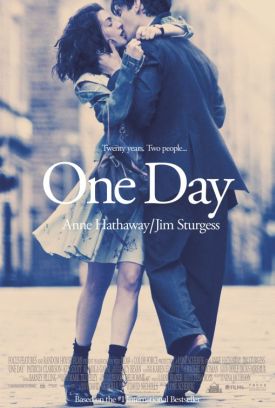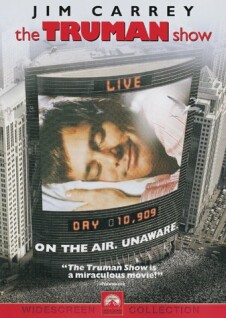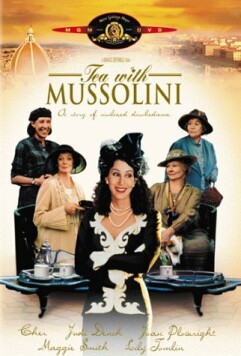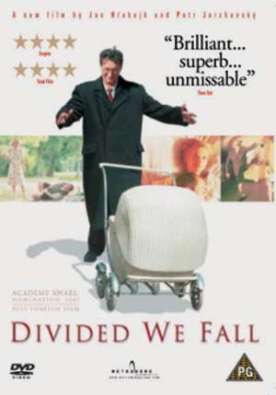One Day
How hard could it be for a former scholar of Winchester College to remember the legend associated with the patron saint of Winchester cathedral?
St Swithun’s day if thou dost rain,
For forty days it will remain;
St Swithun’s day if thou be fair,
For forty days ’twill rain nae mare [sic].
Dexter (Jim Sturgess), the scholar aforementioned, is the principal male character in One Day and he has a vague recollection that there is such a legend. Also that it is somehow associated with the weather. More than that, however, he cannot say when he meets Emma (Anne Hathaway) on St. Swithun’s day (July 15th), 1988, after a night of revelry ensuing upon their graduation from Edinburgh University. I’m only guessing here, mind you, but I think that David Nicholls, adapting his own best-selling novel for the screen, and director Lone Scherfig (An Education, Italian for Beginners) were thinking that Dexter would be more charming for forgetting (he is also drunk) than he would be for remembering. Bad call. At any rate, I don’t find him so, nor do I find him otherwise very prepossessing. In fact, he is little better than a lout, and by the time I saw him (inevitably) educated out of his loutishness, it was too late for me, at any rate, to feel much sympathy for him.
You may find it otherwise and therefore may enjoy One Day more than I did, but Dexter’s charmlessness is only part of the reason I didn’t much care for the picture myself. There is a formula for romantic tear-jerkers, and One Day constantly reminds you of the fact by not entirely sticking to the formula for no very good reason. By formula, that is, Miss Hathaway’s character should be plain, or plainish (as she is in the novel) — at least not the luminous beauty Miss Scherfig must have known Anne Hathaway to be when she cast her in the role of Emma. Likewise by formula Mr Sturgess’s character should be a likeable rogue and wastrel and not the boringly superficial sot, cokehead and celebrity-wannabe he is. Most importantly, the friendship between them has to be persuasive. We have to see what they see in each other. That’s where the charm would come in, if Dexter had any, and where the interesting character foibles of Emma would tell, if she had any.
But both are nearly opaque as characters. Emma is supposed to have poetic ambitions, but we hear almost nothing of her poetry — or even of what she admires in others’ poetry — or her prose either when she turns out to be a (naturally successful) writer of fiction. Clearly, she is meant to be pining for Dexter for more than a decade, but Anne Hathaway doesn’t really do pining. Or even smothered longing. I don’t so much mind her poor Yorkshire accent, which seems to have all of Britain up in arms. I just assumed that she was meant to be affecting the classless, regionless version of mockney (with lapses into both received and regional pronunciation that also seem authentic) that was so popular among the young in the 1990s. But her more general rootlessness seems to go with an emotional affectlessness that make the film’s big moments quite surprising and rather incomprehensible when they come.
One result is that when she abandons her perfect French lover, Jean Pierre (Sébastien Dupuis), for Dexter at his lowest ebb we can only wonder what she is thinking. Or smoking, perhaps, since Jean Pierre is a jazz musician. She sees very clearly what a bum Dexter is but doesn’t allow us to see anything in her that would explain her fatal attachment to such a bum. Nor is Dexter’s own emotional trajectory any more comprehensible. After ageing out of a job hosting what the film calls “car-crash television” with all the sex and drugs supposed to go with it, he apparently lacks any emotional or intellectual hinterland which could account for his lingering attachment to this budding literary superstar as not only his preferred shoulder to cry on but the woman finally to de-bimbify his hectic love-life.
Actually, it’s Romola Garai who gets that job anyway, before she grows as bored with the presumptively reformed Dex as we already are with the pre-reformation model — which is another example of the film’s pointless departure from formula. So Emma is the love of his life but she’s also picked up on the rebound? There’s a modern romance for you! For some, perhaps, these deficiencies will be compensated for by the heart-tugging ending, although that would be pretty emotionally manipulative even if everything else about the movie were perfect. Which it very much is not. Nor can the gimmicky device of tracing the relationship between Dex and Emma through 20-plus years of St. Swithun’s days make up for the failure to turn them into characters we are able to care very much about.
There are good things about the movie. Patricia Clarkson as Dexter’s mum is dying of cancer much more nobly than she was in Pieces of April (2003), and Ken Stott as his dad has some excellent pieces of advice for his wayward son, apart from seeming a much more interesting person. Rafe Spall as Emma’s stop-gap boyfriend Ian has a little of the goofy loser’s charm that we miss in Dexter, but he, too, is rather tiresome in the end, in addition to being so obviously not right for Emma. The chance to tap into the market for nostalgia by tying the story to the one we all know of the last couple of decades might or might not be a good thing, but it is almost completely missed anyway. And for what? For very little in the way of characterization and not even very many laughs. I have not St Swithun’s prognosticatory powers but I foresee a flopperoo — which makes me sad for Miss Scherfig, who has shown signs of being a fine director.
Discover more from James Bowman
Subscribe to get the latest posts to your email.






